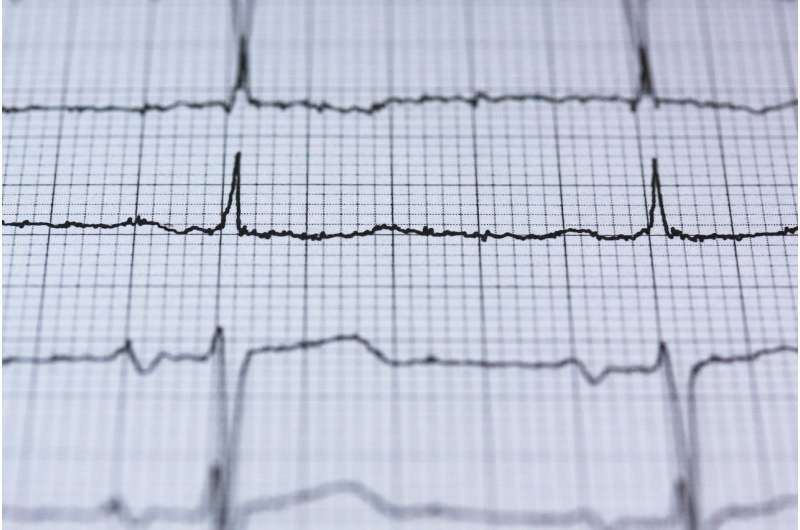Study identifies hospitalized COVID-19 patients at elevated mortality risk

A simple electrocardiogram (ECG) can pinpoint hospitalized COVID-19 patients at high risk of death who might need intensive management. That's the finding of a study presented at EHRA 2022, a scientific congress of the European Society of Cardiology (ESC). Specifically, the research showed that a prolonged QT interval on the ECG was an independent risk factor for both myocardial injury and one-year mortality.
"An ECG is an inexpensive, non-invasive, easily attainable and widely available test applied in nearly all hospitalized patients," said lead author Dr. Ariel Banai of Tel Aviv Sourasky Medical Center, Israel. "Our study suggests that a simple ECG tracing performed upon admission may help healthcare professionals to triage patients with COVID-19 and identify those in need of intensive care."
An ECG records electrical activity as it travels through the heart. The information is displayed as a graph which is divided into sections according to the location in the heart. The QT interval refers to the electrical signal from the moment the ventricles of the heart contract until they finish relaxing and is measured in milliseconds. Patients with a prolonged QT interval are at increased risk for life-threatening arrhythmias (heart rhythm disorders) and cardiac arrest.
This study examined the association between QT prolongation and long-term mortality in patients hospitalized with COVID-19. It also evaluated the relationship between prolonged QT interval and myocardial injury, a condition in which cells in the heart die.
A total of 335 consecutive patients hospitalized with COVID-19 were prospectively studied. All patients had an ECG upon admission. Patients were deemed to have myocardial injury if they showed reduced function on an echocardiogram, which is an ultrasound of the heart, and/or had troponin in the bloodstream. Troponin is a protein found only in heart cells. When the heart is damaged, for example in myocardial injury, troponin is released into the bloodstream.
Patients were divided into two groups according to the duration of the QT interval: 109 patients (32.5%) had a prolonged QT interval and 226 patients (67.5%) had a normal QT interval. Compared to those with a normal QT interval, patients with a prolonged QT interval were older (70 years on average versus 63 years), more often had co-existing conditions such as hypertension, diabetes and congestive heart failure and presented more frequently with severe (as opposed to mild) COVID-19.
Some 78 patients (71.6%) with QT prolongation had myocardial injury compared to 110 (48.7%) with a normal QT interval. Prolonged QT was associated with a two-fold increased risk of myocardial injury after adjusting for age, co-existing conditions and severity of COVID-19. Dr. Banai said: "Interestingly, among patients with myocardial injury half had no troponin in the blood, suggesting blood tests alone may miss a substantial number of patients with this heart problem."
At one year, 41% of patients in the prolonged QT interval group had died compared to 17% in the normal QT interval group. QT prolongation was associated with a 1.85-fold increased risk of dying within a year after adjusting for age, co-existing conditions and severity of COVID-19.
When patients were divided into four groups according to the presence of myocardial injury (yes/no) and QT prolongation (yes/no), those with both conditions had a 6.6-fold higher likelihood of one-year mortality compared to patients without QT prolongation and no myocardial injury.
Dr. Banai said: "In our study, one-third of hospitalized COVID-19 patients had a prolonged QT interval. These patients were generally older and sicker but even after adjusting for these factors, prolonged QT interval was independently associated with worse survival. More studies are needed to confirm our observations, but the results indicate that ECG assessment could play a role in the risk stratification of patients admitted with COVID-19 infection."
More information: The abstract "QT interval prolongation is a novel predictor of one year mortality in patients with coronavirus disease-19 infection" will be presented during the session "Moderated ePosters - Diagnostic methods to improve arrhythmia therapy" which takes place on 4 April. digital-congress.escardio.org/ … e-arrhythmia-therapy





















